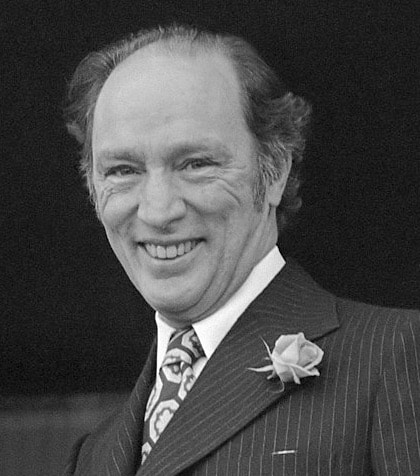
Joseph Philippe Pierre Yves Elliott Trudeau was born on October 18, 1919, into a wealthy and well-educated family in Montreal, Quebec, Canada. Between ages 6 and 12, Trudeau attended the exclusive primary school, Académie Querbes, in Outremont where he excelled in mathematics and religion. From his early education, he became fluent in English and French–an attribute that would serve him well when he moved into Canadian politics. Pierre attended the French-language Collège Jean-de-Brébeuf where it was reported that he performed with distinction in all subjects. After graduation in 1940, Trudeau enrolled at the Université de Montréal where he earned his degree in law. He then pursued further studies at Harvard Law School and the London School of Economics.
After completing his education, Trudeau worked as a lawyer, specializing in labor and civil liberties cases. His political career began when he was appointed as an economic advisor to the Canadian government. He joined the Liberal Party and was elected as the Member of Parliament for Mount Royal in 1965. Pierre Trudeau became the 15th Prime Minister of Canada on April 20, 1968, after winning the leadership of the Liberal Party. He served as Prime Minister until 1979 and then returned to office for a second term from 1980 to 1984.
Trudeau’s tenure saw significant policy changes in Canada. He implemented the Official Languages Act, which aimed to promote bilingualism and strengthen French and English as official languages. His government also introduced the Multiculturalism Act, emphasizing Canada’s commitment to a diverse and inclusive society. Trudeau implemented the National Energy Program to address energy self-sufficiency and national unity issues.
He was a strong advocate for a unified Canada during the Quebec sovereignty movement. Applying his personal motto, “Le raison avant la passion (reason over passion)” he invoked the War Measures Act to establish law and order during the Quebec terrorist crisis in 1970, and in the subsequent years worked to prevent the separation of the province of Quebec from Canada.
Trudeau’s charisma and unconventional style earned him a large following. The term “Trudeaumania” was coined to describe the excitement and popularity surrounding him. He had a high-profile personal life and was known for his relationships with women, including Margaret Sinclair, whom he married in 1971 and with whom he had three sons. After their divorce in 1984, Trudeau remained a dedicated father and had a public life as a single parent.
Pierre Trudeau published his memoirs in 1993, that quickly reached the best-seller list and sold several hundred thousand copies. However, he became increasingly encumbered by complications resulting from Parkinson’s disease and prostate cancer. Devastated by the death of his youngest son, Michael, who died in an avalanche in 1998, Pierre Trudeau died in Montreal, Quebec on September 28, 2000.
Pierre Trudeau is remembered as one of Canada’s most influential and charismatic leaders. His impact on Canadian politics, as well as his contributions to bilingualism and multiculturalism, continue to shape the nation. The Trudeau family remains a prominent political dynasty in Canada, with his son Justin Trudeau also serving as Prime Minister.
